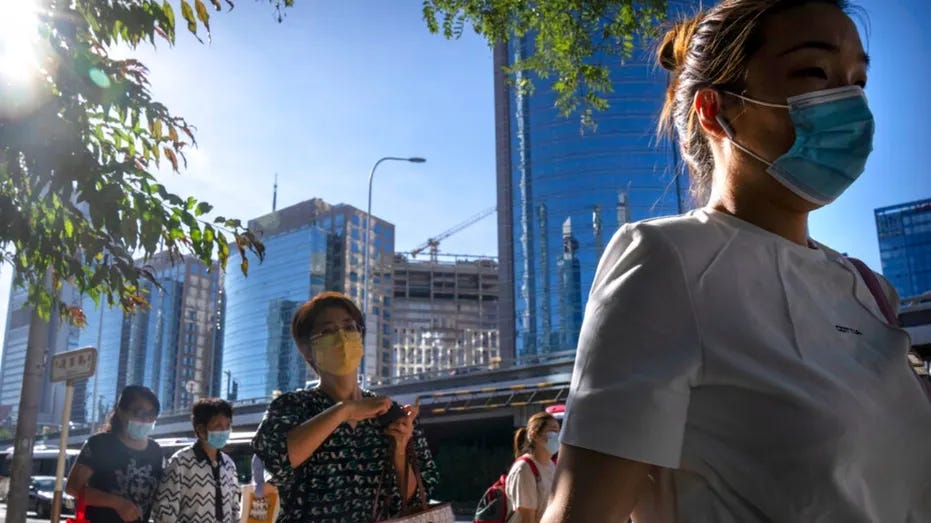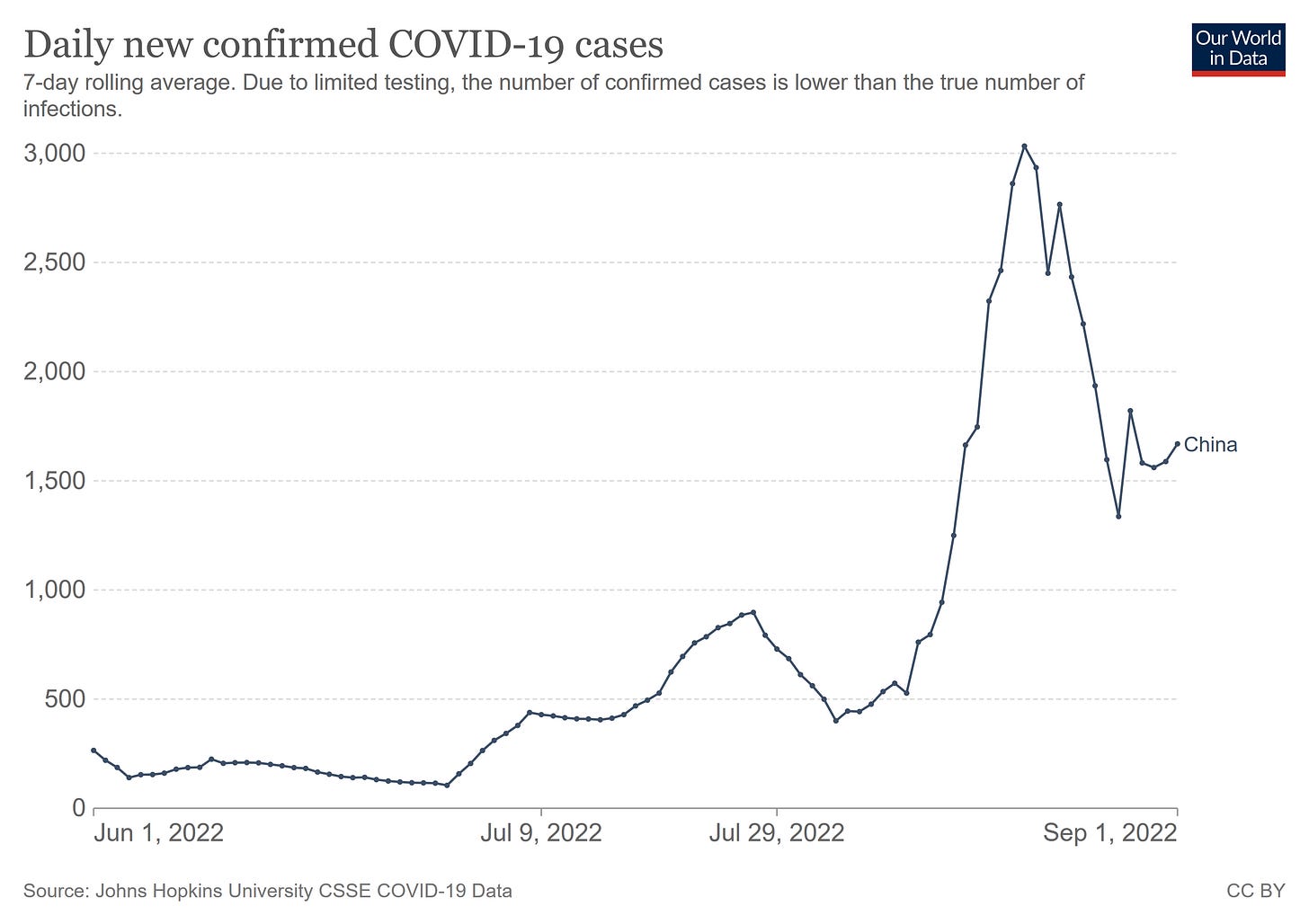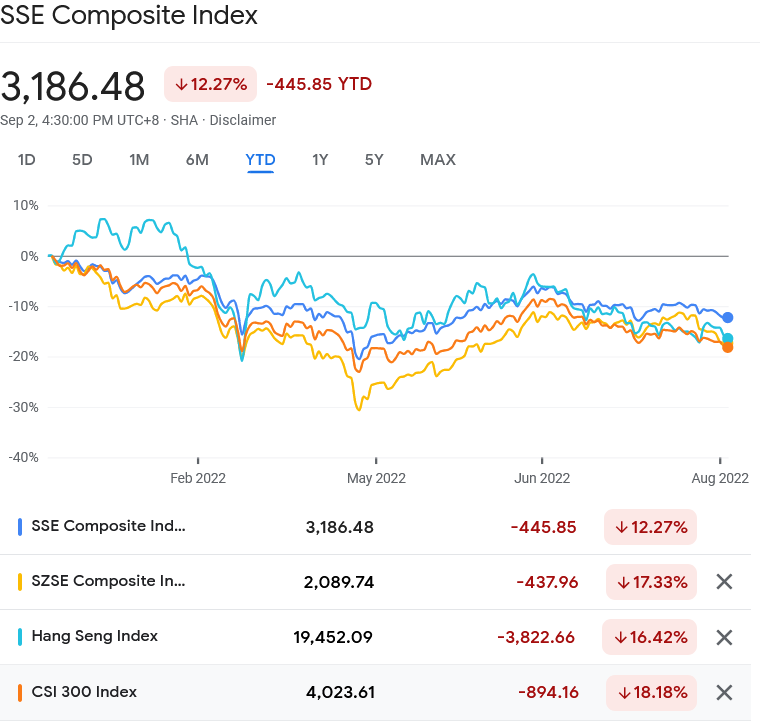Another day, another China lockdown.
Earlier I posted a brief thread about Chinese college students facing virtual “house arrest” at school because of Zero COVID policies.
Left unsaid was the sobering reality that the college kids might still have the better experience, if the alternative is a citywide lockdown in their homes. That is the reality facing over 21 million residents of the city of Chengdu, which has gone into lockdown after a surge of COVID-19 cases there.
While school has been delayed, public transportation is still operating. Approximately 70% of the flights to and from Chengdu have been suspended.
Residents are permitted to leave the city if they can show a special need.
Just one member of each family who can show a negative virus test within the past 24 hours is allowed outside each day to buy necessities.
One person in a household can set foot outside, but only if they test negative. Everyone else in that same household is confined within.
All for a virus that, by China’s official reports, has caused almost no deaths this year.
Chengdu has reported around 1,000 cases in the latest outbreak, with no deaths. On Wednesday there were 157 domestically transmitted infections.
How Zero COVID makes sense when there are zero deaths and zero reasons to fear the virus is to me a mystery.
A New “Surge” Brings New Fears
The Chengdu lockdown is coming amidst a recent reversal of China’s downward trend in COVID-19 cases. After having dropped to a reported 1,560 cases, case counts have begun to mount in the past few days.
Chengu’s recent cases are a part of that new upward trend, as are fresh cases in Shenzhen, which also recently tightened down on COVID-restrictions, although it stopped short of (yet another) “full lockdown”.
Most of Shenzhen's nearly 18 million population is now under COVID controls amid the city's most serious outbreak since spring. But unlike its swift decision in March to lock down the city to fight community infections, Shenzhen has taken a more considered approach in the current flare-up since late August.
As with so many major Chinese cities, Shenzhen has endured multiple waves of lockdown and restriction, and the tech hub, like all of China, lives under the constant threat of returning to a Shanghai-style lockdown.
So real is the fear of lockdown that, as Chengdu’s leaders announced the lockdown, citizens reportedly took to panic buying, stockpiling whatever they could, fearing a repeat of the Shanghai lockdown-cum-humanitarian-disaster this past spring.
Long lines of residents queued for mandatory testing, while videos verified by AFP showed supermarket shelves cleared of produce.
One local, who asked to remain anonymous, told AFP he believed "everyone was crazily stocking up for goods" because of the experience of Shanghai, which was hit by food shortages during its lockdown.
The Costs Of Zero COVID Continue To Mount
At this juncture, that there will be major economic fallout from these latest Zero COVID lockdowns is a given, with the only real unknown the extent of the damage.
Already China’s major stock indices are deep into correction territory for the year, down on earlier Zero COVID lockdowns as well as China’s calamitous drought and heatwave throughout the summer.
The Chengdu and Shenzhen lockdowns are merely additions to an already lengthy record of economic misery for China.
The closure of the city "will deal another major blow to the economy when it's already struggling from a barrage of shocks", Mr David Qu, an economist at Bloomberg Economics, wrote in a report.
While this will not be as damaging as the Shanghai lockdown, which lasted about two months in the spring, "we do expect a widespread impact on sentiment that amplifies the damage beyond the direct hit to activity", he said.
Chengdu has already been reporting quite weak economic data, with retail sales falling in the first seven months of the year, government revenue shrinking, and industrial output losing steam.
Nor are Chengdu and Shenzhen the only large cities enduring this latest cycle of lockdown lunacy, Tianjin and Shijiazhuang, both near the capital Beijing, as well as the northern port city of Dalian, have all imposed various restrictions in recent weeks in response to handfuls of COVID cases, as these latest COVID outbreaks are occuring in more economically vital areas.
"Covid hotspots are shifting away from several remote regions and cities - with seemingly less economic significance to the country - to provinces that matter much more to China's national economy," Nomura Holdings' economists wrote in a report.
Across China, companies are reporting huge losses during the first half of 2022, due in large part to the chaos caused by the “snap lockdowns” imposed under Zero COVID as well as Chin’s ongoing real estate crisis and housing collapse.
More than 4,800 Chinese companies listed in Shanghai, Shenzhen and Beijing have now released their earnings for the first half of the year. It was a bloodbath.
As many as 53% posted a decline in net profit, according to data from Wind and Choice, two major financial information services in the country. That was almost as bad as 2020, when companies posted their worst earnings season on record as the country came to a near standstill during the initial coronavirus outbreak. Back then, 54% of listed companies saw their profit drop in the first six months.
Despite the mounting costs of the policy, however, Beijing remains fixated on its enforcement, especially now as the country is preparing for the CCP’s 20th National Congress, an event held twice in each decade, at which President Xi Jinping will likely secure an uprecedented third term in office, breaking with the post-Mao tradition (and, up until 2018, constitutional limitation) of two terms in office
Xi, who has consolidated enormous power since taking office a decade ago, is widely expected to seek an unprecedented third term as China's top leader, breaking with convention set by his predecessors since the early 1990s.
It's a plan years in the making, ever since Xi removed the presidential term limits from the country's constitution in 2018. But for an authoritarian leader obsessed with stability, the months leading up to it haven't exactly been a smooth ride.
With Beijing determined to make the party congress a sort of coronation for Xi and his expected 3rd term in office, the emphasis everywhere is making Zero COVID “work”, with considerations such as the economic costs of the policy a mere afterthought.
Zero COVID Still Does Not Work
Perversely, despite the reality that the repeated lockdowns are the best evidence of the policy’s complete failure, China’s state media organs persist in presenting the policy both as a success and a necessity.
If China gives up on epidemic prevention and relies entirely on treatment of symptoms, the medical system would run the risk of being overwhelmed, said Ma Xiaowei, director of the National Health Commission (NHC).
"The dynamic zero-COVID policy has proven to be the most effective strategy after rounds of hard battles with highly contagious variants," said Ma, adding that China's approach to epidemic containment is not based on a single specific measure, but relies on science-based decision-making and highly efficient coordination.
Left unexplained is how a strategy that has failed to prevent successive waves of infection can possibly be considered “effective.”
Also unexplained is how it can be that, despite the lockdowns, the majority of COVID cases in China have occurred while cities were under lockdown. This was true of the initial lockdowns in Wuhan and it was true also during the Shanghai lockdown earlier this year.
If a policy based on having zero tolerance for any cases of COVID-19 is unable to achieve a level of zero cases of COVID-19, the policy is a failure by its own terms. Zero COVID has never been anything other than a complete failure by its own terms.
While it may very well be the case that the Zero COVID policy is a net political plus for Xi Jinping and the CCP in the short term, the economic devastation that is attendant upon each and every lockdown precludes the possibility of it being anything other than political suicide even for the CCP over the long term. That Zero COVID imposes permanent restrictions and burdens on students entering Chinese universities, turning their college years into ones of guaranteed virtual imprisonment, raises a permanent obstacle between the CCP and China’s future generations of citizens, workers and leaders alike.
If, as some commentators and reporters suggest, the unspoken and unwritten “social contract” that keeps the CCP in power depends on a level of competent governance, the inability to ever maintain a functioning economy for any period of time surely places the CCP in permanent violation of that unspoken contract. Even if the purpose of Zero COVID is simply the perpetuation of the CCP’s dynastic rule over China, given how Zero COVID is resulting in the CCP effectively dismantling China’s economy, Zero COVID will still end up a complete failure, even by its unspoken political terms.
Zero COVID promises a grim future for the Chinese people. For the citizens of Chengdu and Shenzhen, just as for students entering Chinese universities, just as for Shanghai this past spring, Zero COVID is the assurance there will be zero chance for a future with anything besides repression and privation, which is no future at all.







Their maniacal obsession with fulfilling their zero Covid policy has always been confusing unless you assume that they know something about the virus that they are not sharing with the rest of the world. I have always thought that the virus escaped from the lab in Wuhan simply because that is the most logical explanation given the location of the initial outbreak, presence of the lab, and history of leaks from Chinese labs. You can also assume that the Chinese military had knowledge of the experiments going on there because of their behavior early in the pandemic. There is also plenty of evidence that covid has engineered components to it. Perhaps they are fearful of long-term consequences where even minor infections with the virus are expected to lead to severe health issues long-term because of the engineered components to it. It is admittedly a bit conspiratorial but so many things that were deemed disinformation have been proven to be correct so who knows.
So Europe is committing economic suicide via their sanctions on Russia.
And China is committing economic suicide via Zero Covid.
Interesting times...